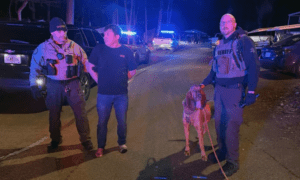A hearing challenging Lane Watts’ standing as chairman of the Fayette County Republican Party was held Aug. 13 before the Fayette County Board of Elections.
Two of the three-person board heard from three witnesses whose testimony indicated that Watts did not reside at the Peachtree City residence during portions of 2011 and 2012 even though the address was listed as his residence on his voter registration paperwork.
The board will render a decision in 5-10 days.
The evidentiary hearing conducted Monday night before Fayette County Board of Elections members Darryl Hicks and Addison Lester dealt with the matter of Watts’ residence at 109 Gelding Garth Lane in Peachtree City from September 2011 through March 2012.
Attorney Richard Hobbs maintained that Watts did not reside at the Gelding Garth Lane address even though Watts’ voter registration paperwork indicated that he did. If Hobbs is correct, Watts could be in violation of Georgia voter registration laws.
From his perspective, Watts’ attorney John Sparks summed up the ongoing controversy as one that has some in the local Republican Party insisting that Watts is not qualified to serve as chairman of the organization.
“It boils down to the internal spat of a private club trying to remove their chairman. And I think that’s not the job of this board,” Sparks said. “If Mr. Hobbs has evidence (of wrongdoing) he should go to the (district attorney). He is trying to get you to do what he’s unwilling to do.”
Hobbs in response said he had attempted to work with Watts, but that Watts had gone behind that backs of those concerned about his residency and took the matter to the Board of Elections in May. The Aug. 13 hearing followed one in May where the board did not find any wrongdoing pertaining to Watts’ residency paperwork.
“I believe the evidence will show that (Watts) did not live at the (Gelding Garth Lane) address on his voter registration card,” Hobbs said.
Testimony at the hearing came from three witnesses. Two of them had resided at the Gelding Garth Lane address during the time that Watts indicated that he lived there. The third witness was a next-door neighbor. Three others were subpoenaed but did not attend the hearing. Those included Lane Watts, Board of Elections member Marilyn Watts — the mother of Lane Watts — and Peggy Perkins.
The first witness was Brad Parsons, who said he lived at the residence during the time in question. Parsons said Watts did not live at the residence nor had he seen Watts at the residence. Parson said he had two roommates during that time, though he could not remember the last name of one of the roommates.
Another witness, Patricia Clements, said she lived next door to the Gelding Garth Lane residence during the September-March time frame. Clements said one of the residents next door at 109 Gelding Garth Lane was her boyfriend and that she spent a great deal of time at his residence. Clements said she had seen Watts only recently, though mail addressed to him would sometimes arrive at the 109 Gelding Garth Lane address.
The third witness was Christian Alfaro, who said he had met Watts once but that Watts had not lived at the residence during the time in question.
After the witnesses’ statements and in relation to the idea that Watts might have committed a crime relating to his voter registration paperwork, Sparks said, “If there is a crime committed, anyone can step over to the district attorney’s office. I can speculate that (Hobbs) has no credible evidence at all.”
The hearing was moderated by County Attorney Scott Bennett.
Hicks and Lester at the conclusion of the hearing said their decision on the matter would be released in 5-10 days.
Prior to hearing from the witnesses there was a discussion on an Aug. 7 emergency motion filed by Watts that essentially questioned whether Elections Supervisor Tom Sawyer had the authority to issue subpoenas on behalf of the elections board and whether the board had the authority to conduct the hearing.
Sparks insisted that the board did not have the authority to conduct the hearing, adding that, “In essence this is an internal squabble in the Fayette County Republican Party,” one that was attempting to use the elections board, “to do what they couldn’t do within the party.”
Suggesting that board members take under advisement the idea that they did not have the authority to conduct the hearing, Bennett nonetheless advised that they proceed with the hearing.
The Monday hearing was only the latest evidence of the conflict inside the Fayette County Republican Party that has been stirring for months. An attempt at a recent party meeting to overturn Watts’ position as chairman was unsuccessful.
Watts’ term ends early next year, and a new vote will be conducted.












Leave a Comment
You must be logged in to post a comment.